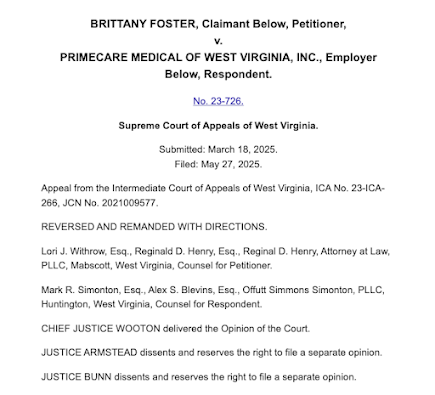In West Virginia, a workers' compensation claim for COVID-19 can be considered compensable even if the disease is common outside of work, as long as the claimant can prove it was contracted in the course of and resulted from their employment. Statistical evidence of general risk is relevant but not the sole determining factor.
The Supreme Court of Appeals of West Virginia recently addressed a crucial issue in workers' compensation: whether a healthcare worker can claim workers' compensation for contracting COVID-19.
The Case at Hand
Brittany Foster, a licensed practical nurse, filed a workers' compensation claim after contracting COVID-19, which she attributed to exposure at her workplace, the Southern Regional Jail.
Her claim was initially found compensable by the Workers' Compensation Board of Review.
West Virginia's Approach to "Ordinary Diseases of Life"
The core of the dispute revolved around West Virginia Code § 23-4-1(f), which outlines a six-factor test for occupational diseases, particularly "ordinary diseases of life to which the general public is exposed outside of the employment."
The Supreme Court of Appeals disagreed with the ICA's narrow interpretation of the law. It clarified that while statistical evidence of workplace risk versus outside risk is "relevant," it is not dispositive of the issue.
The Court found the ICA's reliance on the Risk Factors Study to be erroneous, noting its limitations (e.g., differences between metropolitan and rural areas, early pandemic data).
Ultimately, the Supreme Court of Appeals reversed the ICA's decision, reinstating the Board's finding that Ms. Foster's COVID-19 was compensable.
West Virginia vs. New Jersey on COVID-19 Workers' Comp
Comparing West Virginia's stance to New Jersey's highlights the differences in legislative and judicial approaches to "ordinary diseases of life" and the challenge of proving work-related causation for widespread illnesses.
- West Virginia: As seen in Foster, West Virginia law allows for compensability of COVID-19 claims, even for "ordinary diseases of life," provided the claimant can establish, by a preponderance of the evidence, that the disease was contracted in the course of and resulted from their employment. Statistical evidence of general exposure risk is considered but is not the sole, dispositive factor. The focus remains on the specific circumstances and evidence of causation for the individual claimant.
- New Jersey: New Jersey workers' compensation law, under N.J.S.A. 34:15-31, generally requires a "peculiar to the employment" standard for occupational diseases that are "ordinary diseases of life." This means the illness must be due to causes and conditions characteristic of and peculiar to the particular employment, and not to which the general public is equally exposed outside of employment. For COVID-19, this typically means that frontline workers (e.g., healthcare workers, first responders) might have an easier time proving a direct link due to the nature of their exposure, compared to someone in an office setting. However, it still often requires demonstrating a greater risk or exposure than the general public. While New Jersey has enacted some presumptions for certain essential workers (like first responders) during the pandemic, for others, proving the "peculiar to the employment" element for a widespread virus can be a significant hurdle.
The Foster decision clarifies West Virginia's position, signaling a more claimant-favorable interpretation for COVID-19 claims compared to jurisdictions that might strictly adhere to a "peculiar to the employment" standard without acknowledging the difficulty of proving heightened risk for a ubiquitous virus.
Foster v. PrimeCARE MEDICAL OF WEST VIRGINIA, INC., W Va: Supreme Court of Appeals 2025Workers’ Compensation Benefits for Long COVID
ORDER NOW
*Jon L. Gelman of Wayne, NJ, is the author of NJ Workers' Compensation Law (West-Thomson-Reuters) and co-author of the national treatise Modern Workers' Compensation Law (West-Thomson-Reuters). For over five decades, the Law Offices of Jon Gelman 1.973.696.7900
jon@gelmans.com has represented injured workers and their families who have suffered occupational illnesses and diseases.
Blog: Workers' Compensation
LinkedIn: JonGelman
LinkedIn Group: Injured Workers Law & Advocacy Group
Author: "Workers' Compensation Law" West-Thomson-Reuters
Mastodon:@gelman@mstdn.social
Blue Sky: jongelman@bsky.social
© 2025 Jon L Gelman. All rights reserved.
Attorney Advertising
Prior results do not guarantee a similar outcome.


